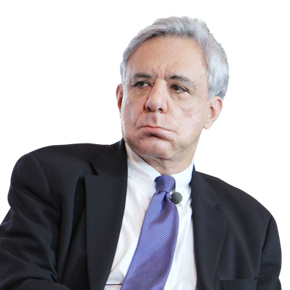Today is Vazgen Sargsyan’s birthday. I dedicate this entry of my memories journal to Vazgen’s memory.
In the period right before and right after the 1998 presidential election, Kocharian would often organize friendly games of basketball. I always participated in those games -- basketball being one of my favorite sports. In my student years, I had played in the Yerevan Polytechnic Student team, and before that, in my highschool years, in the Syrian National Youth team.
On May 14, 1998, we were playing one of our regular games, in the gym of the Red Cross Hospital in Yerevan. We’d just started when Vazgen Sargsyan, the defense minister, rushed onto the court. He had never participated in our basketball games. His game was football. It was obvious that something unexpected had happened and he wanted to talk to Kocharian. Kocharian stopped the game, came off the court and went up to the impatiently waiting Vazgen. They barely began to speak, when he raised his arm and gestured for me to join their conversation. “Russian Defense Minister Sergeev called and said that Foreign Minister Primakov is inviting Oskanian and me to Moscow, for consultations,” Vazgen said. After a very brief pause, Kocharian said, “I don’t see a problem. Go see what he wants.”
We kept talking. There were questions about why so fast, why with the participation of the defense ministers, and whether the Azerbaijani side had received a similar invitation. In those days, there was no negotiations process. The last proposal by the mediators had been made in the fall of 1997 – they had proposed the step-by-step approach which had been followed by serious internal political change in Armenia: the resignation of one president and the election of another. 
On the evening of May 15, Vazgen and I headed to Moscow. Early on the morning of May 16 we headed to a residence that belonged to the Russian Defense Ministry, near the outskirts of Moscow. When we entered, Foreign Minister Yevgeny Primakov, Defense Minister Igor Sergeev and a third man – the head of Russian Intelligence – greeted us. Vazgen and I were accompanied by our then-ambassador to Moscow, Gagik Shahbazian, and Armen Kharazyan, a colleague from our Ministry of Foreign Affairs. He had accompanied me and translated from Armenian to Russian when necessary.
Yeltsin had named Primakov foreign minister in January 1996. He was an experienced official, a heavyweight. He had a huge knowledge base, in part due to his scholarly past. In those days, relations between Primakov and Kocharian were strained. In November 1995, when Kocharian was President of the Nagorno Karabakh Republic, Primakov had gone to Stepanakert, to mediate Prisoner of War exchange between Baku and Stepanakert. Kocharian rejected Primakov’s initiative. Primakov was still smarting from that rebuke. At one point during the 1988 presidential election campaign in Armenia, Primakov had expressed a preference for Karen Demirchyan’s candidacy.
After some time passed, during our private conversations, Primakov and I spoke openly about that mutual discontent. Our own relations had become quite warm after that initial meeting in the outskirts of Moscow. The meeting lasted over two hours and Primakov and I were the main interlocutors.
After a few short welcoming words, Primakov got right down to work. He explained that the purpose of the meeting was for the Russian side to pass on to the Armenian side its own view on the Karabakh issue, and that despite the change of administration in Armenia, the step-by-step approach remained on the table, and that the majority of territories surrounding Karabakh should be returned to Azerbaijan. “And the presence of the power ministers here,” Primakov explained, “is essential, so that the Armenian side recognizes that this is Russia’s common and unified approach, and that the Armenian side doesn’t think that the power ministers may have other approaches, and try to manipulate such differences.”
This, of course, came as a surprise, and for a moment, we were at a loss. Vazgen and I looked at each other, each hoping the other would take upon himself the responsibility of responding to Primakov.
Naturally, the answer was expected from me. First, because on the Russian side, it was the foreign minister, Primakov, speaking, and also because I had already discussed with Kocharian Armenia’s new approaches to the Karabakh conflict. Also, after years of being the Karabakh negotiator, I knew the details of the process. On that day, I was fortunate that Armen Kharazyan was there to translate. Armen was not an interpreter, but he interpreted my words flawlessly, not just in content, but in style and speed. He was interpreting almost simultaneously, which allowed me to speak without pause and without losing my train of thought.
In my mind, our approach to the Karabakh issue was clear as were the basic points of our policy. At that moment, my fundamental challenge was to make them compatible with Russia’s interests in our region. I also knew the content of the negotiations ongoing between Moldova and Transdniester and the memorandum signed on May 7, 1997, which was constructed around Primakov’s proposed idea of a ‘common state.’ So, in my response, I focused on three points.
First, without a resolution of Karabakh’s political status or at the very least, some clarity about that status, the return of any or even a single territory would make Karabakh vulnerable and therefore weaken the position of Russia’s ally Armenia, thus leading to a weakening of Russia’s own position in the Caucasus.
Second, the Armenian side, although rejecting the step-by-step alternative, would not insist on one-sided solutions; rather, the Armenian side believed and was prepared to reconcile the principles of self-determination and territorial integrity through negotiations.
Third, to achieve a resolution on Karabakh, non-conventional approaches would be necessary. I said that for us, for example, a status for Karabakh that makes it de facto independent, but de jure not in Azerbaijan, would be acceptable, and in that context, it would be worth considering a version of the ‘common state’ approach being proposed in the Transdniester conflict, where horizontal relations would be secured between Karabakh and Azerbaijan.
After that long meeting, we were all under the impression that something changed in the Russian side’s initial position. We didn’t have to wait long for confirmation of that assumption. Primakov soon went to Baku, to negotiate over the Karabakh issue. In November 1988, the Minsk Group co-chairs presented the ‘common state’ proposal.
Armenia and Karabakh were just preparing to express an opinion on the document when Azerbaijan quickly and categorically rejected it, thus making a response from our side meaningless. Of course, the ‘common state’ document, as it was, was unacceptable for the Armenian side as well. Although there were efforts being made there to establish solely horizontal relations between Azerbaijan and Karabakh, some provisions made Karabakh seriously dependent on Azerbaijan. However, in general, it was one more very important step on the path to overcome post-Lisbon perceptions and the assumptions of the international community regarding the supremacy of the principle of territorial integrity.
Photo from Vartan Oskanian’s personal archive.
Vartan Oskanian was the Armenian Foreign Minister in 1998-2008.
These views are his own.






















Comments
Dear visitors, You can place your opinion on the material using your Facebook account. Please, be polite and follow our simple rules: you are not allowed to make off - topic comments, place advertisements, use abusive and filthy language. The editorial staff reserves the right to moderate and delete comments in case of breach of the rules.